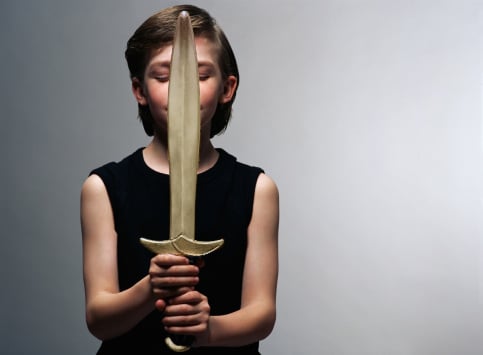“I have bad news,” the ER doctor said.
I almost thought he was kidding. OK, so you have good news and bad news, right? I thought.
But he continued seriously. “Your mother’s hip is broken, she’s bleeding in her brain from the fall, and the CT scan also shows a large brain tumor that’s probably malignant.”
“What?” I asked, trying to process the overwhelming facts. My dad and I looked at each other and began to cry.
Three hours later, still in the same ER cubicle, I remembered what I was supposed to be doing with my mother that day. Our church was holding a women’s tea, and she and I had volunteered to host a table. Just that week we had chosen a pink damask tablecloth and napkins from my mother’s china cabinet and packed up eight place settings of my grandmother’s fine china. The box sat in my laundry room ready to go to the church.
Glancing at my watch, I realized that the other hosts were setting their tables right now, and the tea would begin in an hour and a half. My dad told me to go, and I rushed home, grabbed the box, and raced to the church. My mom had fallen at 6 a.m., so I hadn’t had a shower or breakfast.
When I pulled into the church parking lot, Marlon, who was helping set up, came out to meet me. He took the box from my hands and asked, “Is everything all right?” I immediately thought about how Marlon had lost his young wife from cancer a decade ago.
“My mom fell, and she’s in the ER, and she has a brain tumor . . .” I stammered.
“Oh, I’m so sorry,” Marlon said with his words as well as his eyes, carrying the box to my designated table.
Before I could take one item out of it, Karen, the church secretary, approached. “Are you OK?” she asked gently.
I began to cry, and she hugged me. Then three more women gathered around.
“You go be with your mom,” Debbie ordered. “We’ll take care of this.”
“But what about the table?” I hesitated.
“My mom will host the table,” Debbie continued. “Go!”
“OK.” I nodded.
“Here,” Leisl said, handing me a vase of fresh flowers. “I bought these and didn’t need them in decorating. Now I know what I got them for—take them to your mom.”
As I walked out toward my car, Karen stopped me. “Some of us would like to have prayer with you before you go. Would that be OK?”
I nodded, and she led me into the sanctuary, where Ray and Challis, retired missionaries, formed a circle with Angie, a new church member, Karen, Carolyn and a few others.
They put their arms around me and prayed, one after the other. Then Debbie and Dee packed a tray of finger sandwiches and scones for my dad and me to eat in the ER. Marlon’s teenage son Preston carried the tray to the parking lot.
“Is your mom going to be OK?” he asked earnestly as I opened my car door. I remembered how he lost his mother when he was just 3.
“I don’t know.” I sighed.
Preston reached out and hugged me. “I hope so,” he said.
As I drove back to the hospital, I thought, This is the toughest thing I’ve ever had to handle. But I’m not alone. I have my church family—the body of Christ—lifting up my loved ones and me. They are all ages, with all kinds of backgrounds and experiences, yet they are all a part of Christ on earth. I need Him—and them.


